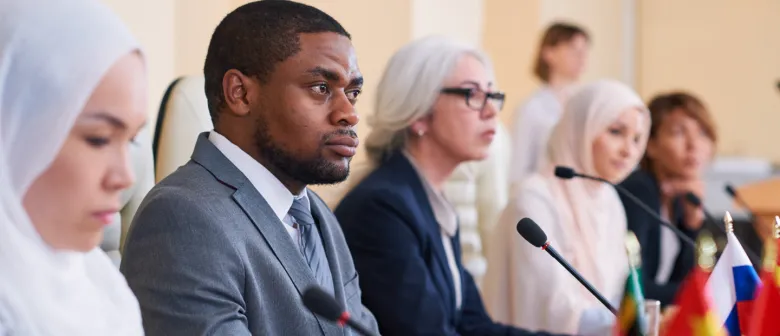
Why diplomatic dialogue?
In addition to its world-renowned executive education programme, the GCSP also actively facilitates diplomatic dialogue. Drawing on our inhouse expertise and widespread global networks, we facilitate inclusive, discreet dialogue to support Track 1 actors and processes, and to inform Track 2 actors (“decision shapers”) with a view to generating creative and policyoriented approaches to addressing security challenges, defusing tensions, and building trust and confidence.
The GCSP Dialogue activities take several different forms:
- Discreet consultations / shuttling;
- Roundtables;
- Workshops;
- Seminars;
- Conferences;
- Customised events and meetings
What is the difference between the two Diplomatic Dialogue Departments?
The Department of Mediation and Peace Support (MPS) focuses on supporting mediation processes and other peace efforts around the world, in an effort to help states, international organisations, conflict parties, or other relevant stakeholders to find peaceful alternatives to conflict. In some cases, MPS complements or directly assists existing processes, while in others it creates new tracks.
The Department of International Security Dialogue's portfolio addresses geopolitical tensions, with a particular emphasis on European security, but also globally.
These dialogue initiatives have 3 interconnected objectives:
- Re-build trust between conflicting parties
- Sustain dialogue on matters of mutual interest and concern
- Think how the future European security order could look like
How can diplomacy be used to resolve a conflict?
Answer: Diplomacy opens up channels of communication that enable the parties to outline their positions, interests, and needs, as well as express their concerns, fears, expectations, and ambitions. By engaging in such an exchange through diplomacy, adversaries can better understand each other, clarify misperceptions, and potentially avoid or resolve a conflict that can be fuelled by miscommunication.
How is diplomacy used to prevent war?
Answer: Diplomacy opens up channels of communication that enable the parties to outline their positions, interests, and needs, as well as express their concerns, fears, expectations, and ambitions.
What is the relationship between international law and diplomacy?
Answer: the practice of diplomacy – at least at the government-to-government level – is largely governed by customary practice and established protocol and codified in international law. International law helps to set acceptable rules of behaviour, and to guide interactions between states and other international actors. Without this set of rules, international relations would resemble anarchic disorder.
Why is diplomacy important in foreign policy?
Answer: Foreign policy has traditionally focused on the pursuit of national interests. Often the respective interests of different countries diverge - a situation that requires coordination, cooperation, or compromise, if conflict is to be avoided. Diplomacy is the mechanism through which states - or other relevant actors - can communicate with one another and find mutually-acceptable solutions.
What is diplomatic dialogue?
Answer: Diplomatic Dialogue is about creating or reinforcing communication channels between states, or other actors who can influence states, with a view to strengthening trust and understanding, reducing tensions, or preventing or resolving conflict. By facilitating talks between adversaries, conflict parties, or other non-likeminded actors, we try to help find creative solutions to their problems.
Is diplomacy effective when conducted by non-diplomats?
Answer: It can be. As long as non-diplomats have the requisite legitimacy (as perceived by their interlocutors), mandate, and skills, they can be effective. In some diplomatic contexts, eg mediation in conflicts, a non-diplomat can be more effective, as the situation may require a neutral party who can facilitate discreet, informal dialogue, which can be difficult for officials to do.
How does the GCSP add value to official diplomatic talks?
Answer: GCSP offers a discreet, informal setting in which diplomatic, track 1.5 or track 2 actors can exchange views and ideas freely. This, coupled with GCSP’s facilitation and expertise in international security issues, creates a favourable atmosphere for identifying common ground and improving understanding. This can complement official talks, which tend to be more formal and less conducive to creative brainstorming.
What expertise does the GCSP bring to official diplomatic negotiations?
Answer: GCSP has considerable expertise in issues that are increasingly relevant to the international security arena (eg artificial intelligence, cyber, space security, and the environment). Our team represents many decades of high-level diplomatic experience, in bilateral and multilateral settings, as well as in peace processes and other sensitive environments – which of course implies mediation, facilitation, negotiation, analytical and other diplomatic skills.
Who participates in GCSP diplomatic dialogue processes?
Answer: a range of people, depending on the specific needs of the situation. These can include officials or former officials, diplomats, experts, thinktanks, and others who have either a deep knowledge of the given context, or strong connections to decision-makers. Their exact identities are kept confidential, unless they expressly wish otherwise.
What has the GCSP achieved through diplomatic dialogue activities and what does it aim to achieve?
